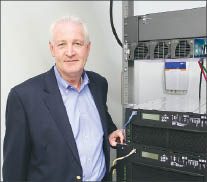
Home » Fuel cell maker ReliOn forecasts big growth surge
Fuel cell maker ReliOn forecasts big growth surge
Fuel cell maker expands markets, says profitability closer

February 16, 2012
ReliOn Inc., the Spokane Valley maker of fuel-cell-powered critical backup power systems, says it expects strong revenue growth this year and to attain profitability next year through expanding markets, new product sales, and general settling in its telecommunications-industry customer base.
The nine-year-old company makes auxiliary power systems that run on hydrogen fuel-cell technology. Its primary customers are in the telecom, utility, transportation, and government sectors.
ReliOn expects nearly 50 percent growth in revenues this year, following two years of flat revenues, says Gary Flood, the company's CEO.
"We didn't see a lot of growth between 2010 and 2011," Flood says. In those years, ReliOn's biggest customers tended to put off capital expenses.
"This year, that's behind us," Flood says. "We already know where half of our projected revenue for this year will come from."
The company managed to avoid declines in revenues by expanding its international market and continuing to research and develop new products and applications for the technology.
In 2011, 88 percent of the company's sales were in North America. This year, ReliOn expects that percentage will drop to 60 percent, Flood says.
"We'll still grow in the U.S.," he says. "We're just seeing a higher proportion of growth internationally."
ReliOn occupies 29,300 square feet of leased space in two buildings at 15913 E. Euclid. It employs a steady core of 47 people there and hires temporary workers to ramp up its workforce to 65 employees as orders warrant. The company handles the core scientific research, product development, and manufacturing of its products at its Spokane Valley facility, but it contracts out some component manufacturing to other companies here, such as Spokane Valley-based Servatron Inc.
"Our business is lumpy," Flood says. "You get one order and may not get another for a while."
Also, he says, customer orders can range in value from a few thousand dollars to millions of dollars.
That said, no single customer provides more than 18 percent of ReliOn's annual revenues, Flood says.
"It's level enough so that any one action by a customer won't be devastating," he says.
ReliOn has more than 1,400 systems installed in 38 U.S. states and 28 countries with a total power-generating capacity of more than 4.1 megawatts. System capacities range from 50 watts to 20 kilowatts.
Flood says ReliOn holds a significant market share in every market it's in. "Our objective is to be a major player in all of our markets," he says. "We're No. 1 in most markets we're in—certainly in North America."
ReliOn's customers in the U.S. include telecom giants Sprint Nextel Corp., AT&T Inc., and Verizon Communications Inc.
The company's competitors include IdaTech LLC, of Bend, Ore.; Hydrogenics Corp., of Mississauga, Canada; and P21 GmbH, of Munich, Germany.
In the U.S., ReliOn has its own domestic sales force that sells directly to customers. Outside of the U.S., the company sells its products through other partners and distributors, which reduces its sales expenses, Flood says.
One of those partners, Hoppecke Batterien GmbH, a German industrial battery and charging-system manufacturer and supplier, "has connections with all the people we want to talk to" in Europe, the Middle East, and Africa, he says.
Flood says ReliOn hopes to crack the Japan market next.
Prior to the March 11, 2011, earthquake that devastated Japan's eastern seaboard, killing thousands and knocking out nuclear power plants, Japanese representatives had confidence in their power supply and grid and saw little need for backup power systems.
Now, a Japanese government mandate requires that telecom providers there have the capability to operate independently of the power grid, Flood says.
"I see a change in attitudes," he says.
Still, the market there isn't opening quickly for ReliOn.
"You've got to have an entry," Flood says. "That takes time."
Spokane-based Avista Corp. spun off ReliOn in 2003, and it has operated as an independent, investor-backed venture since then, with Avista among its major investors.
"We've had a good level of support from financial groups and investors," Flood says.
ReliOn secured $6 million in equity financing from its investors last year.
"We're very close to being cash-flow positive," Flood says, adding that the company likely will turn its first annual profit in 2013.
After ReliOn reaches the profitability benchmark, the company will continue to invest in its own growth, he says.
"Other applications can use our technology," Flood says. "There will be a lot more choices to invest profits and expand market opportunities."
A ReliOn system generates a direct current via an electrochemical reaction when hydrogen gas is piped through a fuel cell housing a technology called a proton exchange membrane. The electrons from hydrogen atoms enter an electrical circuit while hydrogen protons pass through the membrane. Once the electrons complete the circuit, they recombine with the protons and oxygen from ambient air to form water vapor, the system's only byproduct.
ReliOn's new E series of backup power systems include a unit the size of a large microwave oven that can provide 2.5 kilowatts of power. It's more than a third smaller than the company's established 2,000-watt fuel cell system, the T-2000.
"Each generation of products performs better and meets price points better," Flood says.
Looking further ahead, ReliOn is developing direct-liquid fuel cell technology for which it recently was awarded a patent. The direct-liquid fuel cell would use methanol, or wood alcohol, as the fuel source to generate power using the proton-exchange technology.
Eventual applications for such fuel cell technology could replace conventional batteries in portable electronic devices, such as cell phones, laptop computers, and digital music players, potentially offering greater run times and less environmental impact than batteries, Flood says
Latest News
Related Articles





